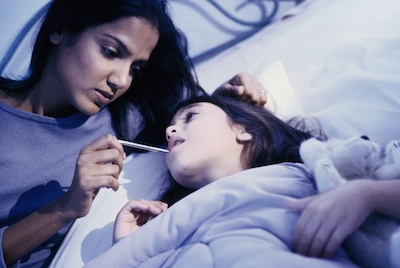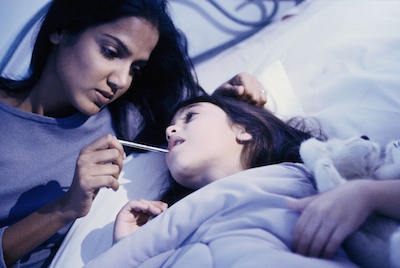 Fevers range from mild ones to those that can be frightening to parents. How do you know when one is serious, and when to call the doctor for a fever?
Fevers range from mild ones to those that can be frightening to parents. How do you know when one is serious, and when to call the doctor for a fever?
The Cleveland Clinic defines a fever as a temperature over 100.4 degrees F, which is almost 2 degrees above the average body temperature of 98.6 F. People’s body temperatures fluctuate throughout the day, and “can differ by age, activity levels and other factors. Don’t be alarmed if your child’s temperature varies. The magic number for fever is 100.4 F.”
Fevers that are typically not a matter of concern, according to the Cleveland Clinic, include these:
- Low-grade fevers that occur shortly after your baby or child received immunizations. These fevers are typically normal if they last less than 48 hours.
- Fevers of less than five days; this is especially true if your child is eating and drinking normally, and is acting fairly normal (even if he or she is more tired).
- Fevers with temperatures of 102.5 F or less for children aged 3 months to 3 years; or temperatures of up to 103 F if your child is older. In and of themselves, they are “not necessarily worrisome.”
Parenting.com shares recommendations from the American Academy of Pediatrics that describe when you should contact your child’s doctor. They include:
- When your child is 3 months old or younger
- When your child (older than 3 months) has a fever for more than three days straight WITH an obvious source of infection
- Fevers with NO obvious source of infection
- Fevers that accompany sore throats that last for more than 24 to 48 hours.
- When dehydration signs exist, which can include a dry mouth, fewer wet diapers (less than one in eight hours) or sunken soft spots
- Those accompanied by complaints of pain when urinating
- Signs of lethargy or difficulty breathing
- Fevers accompanied by rashes
- When your child won’t eat
- When your child experiences a febrile seizure
The article provides more examples of when to call the doctor, along with emergency situations to watch for. Times when you should call the doctor immediately include when your child is:
- Having trouble swallowing or is drooling because he or she can’t swallow saliva
- Experiencing a stiff neck, or purplish patches or tiny red spots on his or her skin
- Experiencing severe pain
- In a situation where he or she has compromised immunity (perhaps because of chemotherapy treatments for cancer)
The article lists more examples of when to call a doctor immediately, so we encourage you to read all the text.
Not All Fevers are Bad
Scary as fevers can be for parents, not all are bad. In the article Fever Checklist in Family Living at its Best, a pediatrician says, “Fevers can be a sign of an illness, and can be part of the body’s way of fighting infection by making the body temperature inhospitable to certain viruses and bacteria.” In these instances, rest and fluids may be enough to manage the fever.
On the flip side, though, the article encourages parents to trust their intuition. If “your parent intuition says something is just not right, no matter what their temperature is,” contact your child’s doctor.




